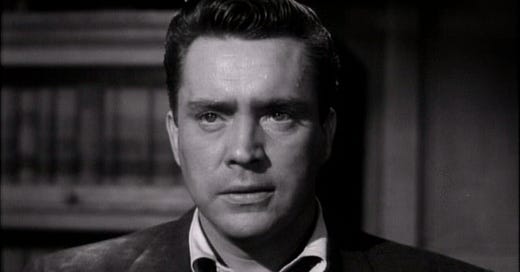Of all the predicaments that ever befell the characters in noir world, knowing that you’re dying and there’s nothing you can do about it except spend your last moments trying to find out who killed you, has got to be in the top 10.
Written by Russell Rouse and Clarence Greene and directed by Rudolph Mate, D. O. A. (1949 or 1950, nobody seems to be sure) has one of the best set-ups of any film noir ever: Frank Bigelow (Edmond O’Brien) walks into the Homicide Division of a San Francisco police station to report a murder: his own. In the flashback, we learn that Bigelow is an accountant and notary public living in Banning, California. He decides to go to San Francisco for the weekend, much to the dismay of his girlfriend Paula Gibson (Pamela Britton). While there, he is poisoned. When told he only has days to live, he tries to work out who did it and why.
This utterly perfect set-up could not be any more noir. It’s immediately intriguing and it puts us right where we need to be. Who did this? Who killed Frank Bigelow? Who can we trust in this story? D. O. A. is perhaps not the most visually striking of all the films noir. The sense of urgency doesn’t leave much room for shades and street lamps, apart from the glitz of San Francisco. Nor does it have a lot of cool lines, apart from the ones spoken by Neville Brand, in one of his many tough guy roles. But it does do the one thing noir can’t do without: a doomed character.
‘Do you realize what you’re saying? You’re telling me that I’m dead.’ Frank Bigelow
Right from the beginning, we are met with a character who is literally dying in front of our eyes. All he wanted was to get away and enjoy himself in San Francisco, then come back to Paula and then perhaps the two of them could have had a future together. His womanizing ways maybe get in the way of us rooting for them, but he is mostly harmless, as far as noir characters go.
‘Because I did take that poison and nothing can save me’ Frank Bigelow
The solution to the mystery adds to the nihilist aspect of the film and of film noir in general. Frank Bigelow didn’t deserve what happened, but he couldn’t stop it. Most noir characters at least try to stay alive; that’s the bare minimum in this world. Most noir characters know that there’s a chance, somewhere, somehow. Frank Bigelow knows there isn’t. Of all the losers featured here, Frank Bigelow lost the most.
We bid farewell to Frank Bigelow and D. O. A. Our next loser is a streetwise waitress who gets caught up in something she could have done without. The film is Fallen Angel (1945), the actress is Linda Darnell and the loser… is Stella.
See you on the sunny side of the street.





Yes, one of the best plot ideas for a film. O’ Brien was wonderful in the role.
O'Brien is another one of those great supporting actors who should be more celebrated- especially since he was an Academy Award winner (for "The Barefoot Contessa").